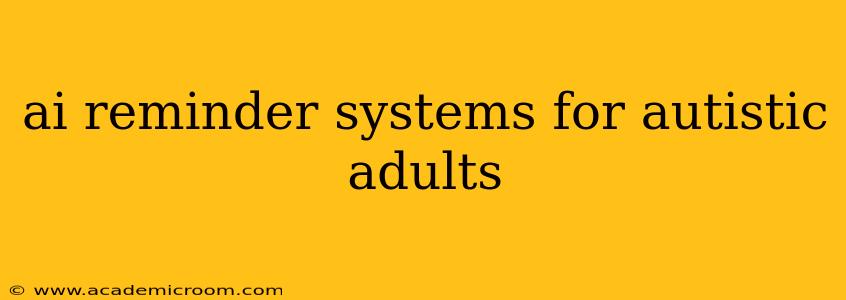Many autistic adults find significant benefits in using technology to manage daily tasks and routines. The inherent challenges of executive functioning, sensory sensitivities, and social communication can often be mitigated with the right tools. AI-powered reminder systems offer a particularly effective solution, providing personalized support and flexibility that traditional methods often lack. This article explores how these systems can improve the lives of autistic adults and addresses common questions surrounding their usage.
What are AI reminder systems, and how do they help autistic adults?
AI reminder systems leverage artificial intelligence to create highly customizable and adaptable reminder systems. Unlike simple alarm clocks or calendar notifications, these systems often incorporate features such as:
- Personalized Notifications: Adjusting the method of notification (audio, visual, haptic) and the level of detail provided to accommodate sensory sensitivities. This might include opting for gentler sounds or visual cues over jarring alarms.
- Flexible Scheduling: Setting reminders based on time, location, or even context (e.g., "Remind me to take my medication after dinner"). The flexibility is key for managing unpredictable schedules.
- Adaptive Learning: Some advanced systems can learn user patterns and preferences, becoming more effective over time. For example, if a user consistently snoozes a reminder, the system might adjust the notification strategy.
- Integration with other apps: Connecting with calendars, to-do lists, and other apps to provide a centralized system for managing tasks and appointments.
These features directly address challenges faced by many autistic adults. The personalized nature allows for greater control and reduces anxiety associated with unexpected tasks or sensory overload. The flexibility helps to navigate the complexities of daily life, promoting independence and reducing reliance on others.
What are some examples of AI reminder systems suitable for autistic adults?
While specific applications are constantly evolving, several categories of apps and devices incorporate AI capabilities that can be particularly beneficial:
- Smart Home Assistants (e.g., Alexa, Google Home): These devices offer voice-controlled reminders, making them accessible and convenient, especially for those with motor skill challenges.
- Smartwatch Apps: Many smartwatch apps allow for discreet, haptic reminders, minimizing sensory overload.
- Dedicated Reminder Apps: Various apps on smartphones and tablets are specifically designed for task management and offer features like customizable notifications, visual aids, and progress tracking. Look for apps that allow for detailed customization and integration with other apps.
It's essential to explore different options and find the system that best suits individual needs and preferences.
How can I choose the right AI reminder system for myself or a loved one?
Selecting the right AI reminder system involves careful consideration of individual needs and preferences. Key factors include:
- Sensory sensitivities: Consider the types of notifications (audio, visual, haptic) that are least likely to cause sensory overload.
- Technological proficiency: Choose a system with an interface that's easy to understand and navigate.
- Specific needs: Identify the types of reminders needed (medication, appointments, tasks) and ensure the system can accommodate these.
- Integration with other apps: Determine if integration with calendars, to-do lists, or other apps is necessary.
- Cost and accessibility: Consider the financial implications and whether the system is accessible to users with disabilities.
Trial periods or free versions of apps are often helpful in determining if a system is a good fit.
Are there any downsides to using AI reminder systems?
While AI reminder systems offer numerous benefits, potential downsides include:
- Technological reliance: Over-reliance on technology can hinder the development of independent coping mechanisms.
- Privacy concerns: Consider data privacy implications when using AI-powered apps.
- Cost: Some advanced systems may be expensive.
- Technical difficulties: System malfunctions or software updates can disrupt the service.
It's crucial to use these systems as tools to support independence, not to replace other crucial skills.
How can I ensure privacy while using an AI reminder system?
Prioritizing privacy when using AI-powered reminder systems is crucial. Before selecting a system, carefully review the app's privacy policy and understand how your data will be collected and used. Choose reputable developers and consider opting out of data sharing features wherever possible. Regularly review your app permissions and ensure they are aligned with your comfort level.
By carefully considering these factors and selecting the right system, autistic adults can significantly improve their ability to manage daily tasks and routines, increasing their independence and overall well-being. Remember that finding the perfect system may require experimentation and patience, but the potential benefits are substantial.
